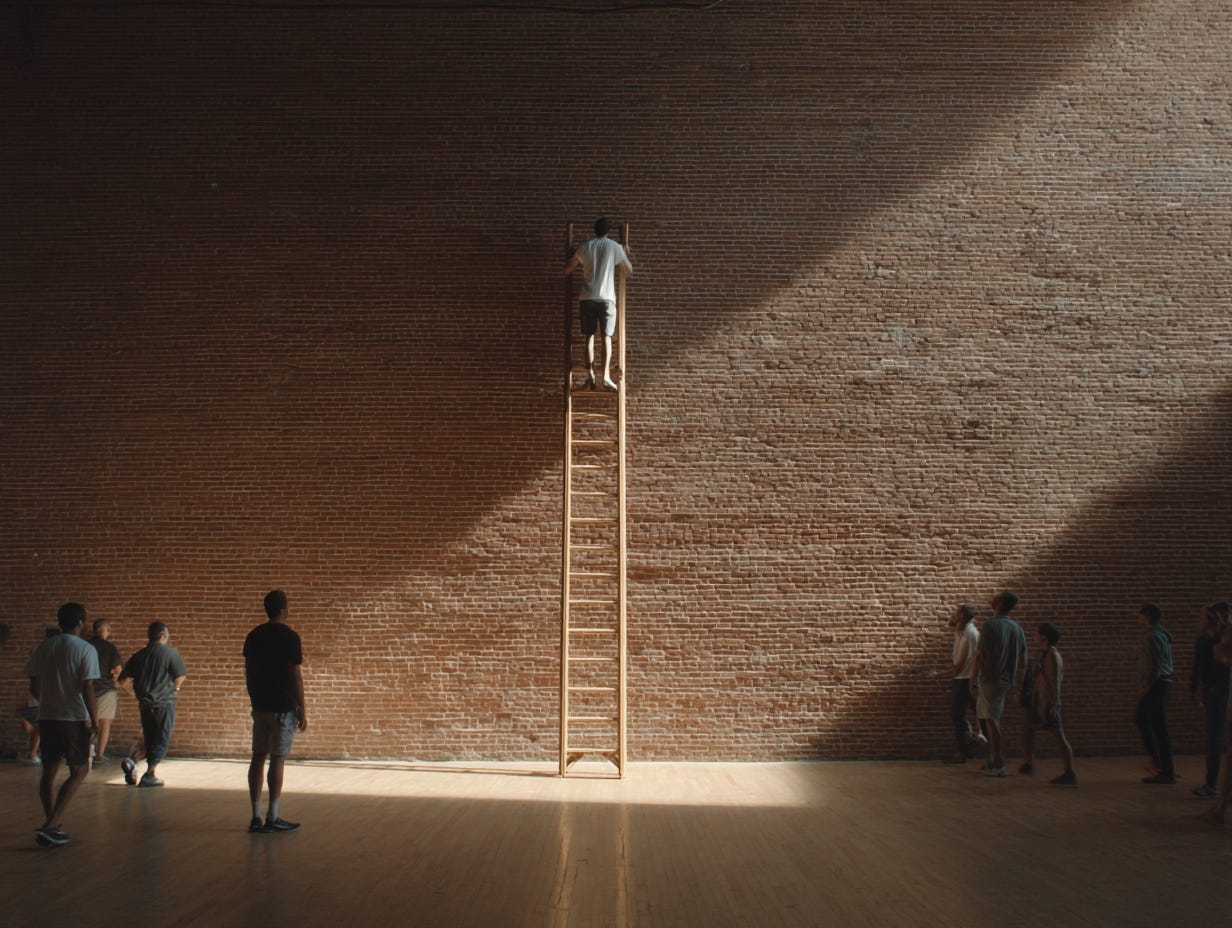“Someone always has it worse”
That’s one of the adult versions of what my mum used to say when I was little: “There are people in the world who are starving, finish your dinner.”
You might hear yourself say it when you're upset or when you want something new. You feel it in the pause between ambition and action.
You think, "I should be happy with what I have." And maybe you sort of are, but there's also a whisper inside that says: "I want more."
Then maybe the guilt arrives, wagging its morally superior finger.
This is the comparison paradox in action.
What Is the Comparison Paradox?
It connects to several well researched psychological concepts such as The Social Comparison Theory, which explains our tendency to evaluate ourselves against others. Relative Deprivation describes how we judge our lives based on comparisons to others, rather than what we actually want or need. And the ever growing ambition of wanting more links to the Hedonic Treadmill, which explains why achievement often leads to only temporary satisfaction.
The Comparison Paradox is the emotional conflict where you want to grow, improve or follow your dreams, but you pause and wonder if you really deserve it, because you know other people have it much worse than you do.
I was referred for CBT last year through my job to help me work on some things and generally improve my wellbeing. On day one I asked the question: "Should I really be here? I could be taking up the space of someone who needs it more than me."
It turned out that question took a couple of sessions to iron out completely. It said a lot about who I am and why I was there in the first place. I put other people first, I was a people pleaser. I'd do anything to help anyone, often at my own detriment.
My therapist explained to me that life is not a zero sum game. For me to win, doesn’t mean somebody else has to lose.
Climbing The Ladder of Ambition
It feels like climbing a ladder and apologising for stepping on every rung:
"Sorry, I know not everyone even has a ladder."
"Sorry, I know this ladder is nicer than some."
"Sorry, I didn't build the ladder myself."
Sometimes you might not even want to get your ladder out of the shed, you might feel that you should suffer the same as those who don't have one, grasping to reach the top of the wall.
At some point, you might wonder, what's the point in having a ladder at all if you feel guilty for using it. The worst part is that deciding to not use it might feel like the noble choice.
It took me a long time to realise that I shouldn’t feel guilty for any advantages I have in life, especially if those advantages came about due to my own hard work.
Downward comparison is often recommended as a gratitude practice, but I never felt grateful that I had a ladder, only empathy for those who don’t.
Where Does This Guilt Come From?
Personally, I honestly don't know. I’ve tried to think back in time to my own childhood so I could get to the root of the guilt but nothing stood out.
1. Childhood Were you ever told "You should be thankful." when you were young, and maybe wanted more?
2. Cultural Conditioning Especially if you're British. If anyone shows an ounce of ambition they might be met with a sarcastic "Ok, Calm down Elon." There's a fine line between confidence and arrogance and if it looks like you're straying into the latter, someone will let you know.
3. The Trauma Olympics Social media feeds make it worse. You see someone struggling publicly and think, "Who am I to complain?" We've gamified pain, like only the gold-medal sufferers get to speak.
Why This Model Is Flawed
Acknowledging someone else's pain doesn't mean you have to deny your own growth.
It's not a morality contest. There are no bonus points for keeping your dreams small so other people won't feel bad.
Let's try a thought experiment: If you're out walking with a friend and you both take a tumble. Your friend has a broken leg, bone puncturing the skin, they're in a massive amount of pain and you've sprained your wrist, but are otherwise ok, do you:
Refuse all treatment because your friend has it worse.
Demand the ambulance take you to hospital before your friend.
Seek treatment as well as your friend because you still need it?
This is a variation on how my therapist framed it to me. You can easily take care of yourself without abandoning others.
Stop thinking of life as a finite pot of happiness. Your joy doesn't steal from someone else's share.
Reframing Desire and Gratitude
You don't need to pick sides, you can be grateful for what you have, and still want more. No guilt required.
If gratitude is the fuel, ambition is the engine. Gratitude keeps you grounded and ambition helps you grow.
So reframe your inner voice. Instead of:
"Who am I to want more?"
Say:
"Who could I become if I allow myself to?"
Understanding concepts like the Hedonic Treadmill can help us approach growth with more realistic expectations. Rather than expecting permanent happiness from our achievements, we can recognise that we may always want to keep climbing.
Self improvement is a natural psychological tendency and I think that building meaningful progress is something that we need to stay alive.
I'm at the age where I see older colleagues retiring after long successful careers, on more occasions than can be coincidence their retirements were cut unnaturally short. I honestly think that this can partly be explained by those people stepping off the hedonic treadmill. When you stop wanting more, something inside you shuts down and if you have nothing to strive for, do you have anything to live for?
Real Life Situations You Might Recognise
1. The Stressed Parent You adore your kids. But sometimes you want silence, space, or a day to just be you. Then guilt slaps you across the face: "Some people can't have children. Be grateful!"
Wanting some time to yourself doesn't make you a bad parent.
2. The Career Drifter You have a job that pays the bills. People tell you you're lucky, but inside, you're so bored. You imagine a different more exciting career path, then shut it down: "Some people can't get work at all, I should be thankful."
You can appreciate what pays the bills and still chase what feeds your soul.
3. The Functioning Neurodivergent You're holding yourself together with bits of tape and string and to the outside world you look like you're doing well. Then someone says, "You seem fine, not like my friend who really struggles with..." Then you start doubting your own needs.
Functioning isn't flourishing, coping isn't thriving.
The Question of Privilege
Some of us start from different places on life's game board. Some people have advantages like geography, financial security, education, supportive families, good health, etc. That other's just don't.
I was born in England to hard working parents who never let me starve and provided me with the opportunity to thrive through school and attend university. Add to that I am a white male and I know that there are challenges I don't even need to consider that other people have fought for their whole life.
I can recognise those privileges I was born with, and the ones I earned without feeling shame. Acknowledging your advantages doesn't mean you forfeit your right to growth and it doesn't mean that you need to ignore them either. It just means growing mindfully, with an awareness of the full picture.
Permission to Want More
You're allowed to want more than you have. You're allowed to want better than you ever dreamed. And you don't need to apologise for any of it. It's not greedy to want to better yourself.
You can care deeply about others and care deeply about yourself. You can be grateful for your life and redesign parts of it.
There is no trophy for staying small out of guilt.
Is there anything in life that you have talked yourself out because you felt you didn't deserve it?
Have you ever passed up an opportunity because you felt that someone else deserved it more?
Have you ever felt ashamed of wanting more from life?
I'd love to hear that I'm not alone, and if I'm not I hope this helps you.











This really spoke to me as I was just thinking why am I so easily dissatisfied and always dreaming so big when I have so much to be grateful for? Thanks for reminding me that always striving for more is nothing to feel guilty about.
Man, really enjoyed this one. The trauma olympics was both funny and accurate. Nice nuance brother